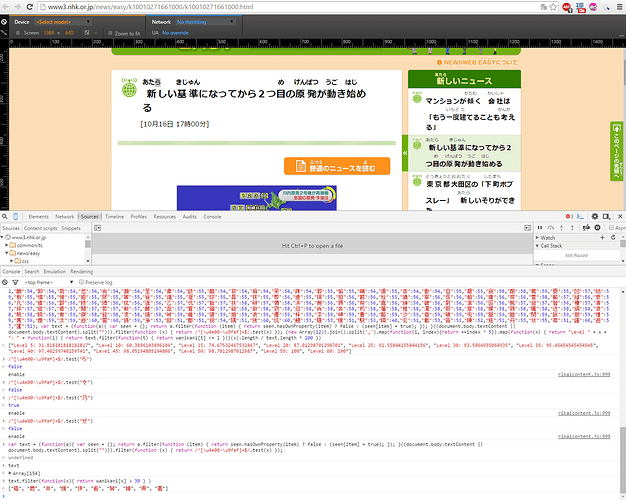Thanks for sharing Breadstick. Looks useful.
Xyresic pasted a wall of JavaScript code and said…JavaScript can do many things, but I have yet to see a way to have it steal someone’s first-born. Then again, there’s probably a library for that…
[…]
All you have to do is copy+paste the code below, launch the JavaScript console on your browser (press F12), then paste it into the box and press enter. Of course, that’s only if you trust what I just pasted and that it’s not going to steal your first-born baby or something.
Awful jokes aside, if you want to avoid fiddling with the console you can bookmark <strike>the address of this link</strike> the code below which is just @Xyresic’s code modified to work as a JS bookmarklet that displays the info in an alert box. Fair warning, though, your browser may hate a little you if you try it. In Chrome, the UI slows a bit when hovering over the bookmark, but it still works properly when clicked.
EDIT: Though I was trying to avoid another massive wall of JS, the forum’s post editor wouldn’t accept a link with such a long address, so here’s the full code (sorry):
javascript:wk = [[“卵”,32],[“浜”,28],[“七”,1],[“謎”,44],[“二”,1],[“雇”,39],[“加”,19],[“潔”,28],[“三”,1],[“鳩”,46],[“山”,1],[“衆”,28],[“値”,22],[“岐”,39],[“大”,1],[“女”,1],[“芽”,44],[“販”,24],[“巨”,28],[“排”,40],[“湧”,60],[“才”,2],[“替”,25],[“煙”,18],[“仙”,39],[“員”,12],[“奪”,39],[“階”,12],[“度”,9],[“卓”,45],[“右”,2],[“聡”,51],[“意”,11],[“拒”,39],[“甘”,36],[“白”,2],[“牛”,3],[“磨”,45],[“花”,4],[“牙”,36],[“公”,3],[“鋼”,39],[“玉”,2],[“応”,22],[“立”,2],[“笛”,19],[“微”,28],[“位”,11],[“切”,3],[“陥”,52],[“札”,7],[“太”,3],[“量”,24],[“竹”,4],[“寺”,15],[“戸”,3],[“代”,4],[“貸”,27],[“婦”,28],[“神”,11],[“少”,3],[“舞”,36],[“各”,22],[“誘”,27],[“欄”,54],[“他”,4],[“氷”,4],[“有”,6],[“肉”,5],[“頂”,51],[“矢”,3],[“母”,3],[“章”,12],[“皮”,4],[“埼”,39],[“史”,19],[“飯”,15],[“皿”,4],[“四”,2],[“農”,10],[“休”,4],[“小”,2],[“洋”,11],[“手”,2],[“資”,21],[“短”,12],[“惰”,52],[“充”,39],[“易”,19],[“町”,4],[“耳”,4],[“未”,7],[“退”,27],[“糸”,4],[“例”,14],[“虫”,4],[“剰”,53],[“不”,4],[“学”,5],[“交”,5],[“成”,11],[“練”,13],[“凍”,28],[“仕”,4],[“万”,3],[“漸”,60],[“行”,5],[“同”,5],[“希”,14],[“駅”,13],[“鳴”,10],[“西”,5],[“協”,14],[“体”,5],[“児”,28],[“貫”,52],[“声”,5],[“湿”,45],[“目”,2],[“走”,5],[“亡”,6],[“収”,23],[“金”,5],[“空”,5],[“雨”,5],[“谷”,5],[“青”,5],[“林”,5],[“第”,12],[“安”,6],[“入”,1],[“畔”,60],[“判”,21],[“括”,42],[“季”,14],[“固”,14],[“車”,4],[“親”,10],[“両”,6],[“乗”,9],[“涙”,44],[“集”,10],[“九”,1],[“血”,6],[“父”,3],[“勧”,39],[“繊”,53],[“違”,24],[“回”,5],[“知”,6],[“明”,6],[“歩”,6],[“店”,6],[“枯”,51],[“周”,14],[“権”,21],[“科”,6],[“犠”,40],[“味”,11],[“南”,6],[“沸”,51],[“茶”,6],[“椅”,46],[“活”,6],[“海”,6],[“百”,4],[“赤”,4],[“惨”,53],[“孔”,46],[“由”,7],[“恋”,17],[“怠”,52],[“失”,7],[“全”,6],[“必”,7],[“久”,3],[“翔”,45],[“末”,7],[“校”,7],[“般”,36],[“裂”,43],[“家”,7],[“遭”,52],[“紙”,7],[“帥”,53],[“対”,8],[“理”,7],[“魚”,7],[“逸”,54],[“燥”,51],[“鳥”,7],[“船”,7],[“雪”,7],[“黄”,7],[“週”,7],[“胡”,53],[“用”,3],[“君”,8],[“暗”,13],[“布”,19],[“接”,26],[“幻”,17],[“投”,8],[“杯”,29],[“役”,8],[“作”,5],[“紋”,54],[“買”,8],[“研”,8],[“馬”,8],[“飛”,20],[“負”,9],[“瓶”,51],[“島”,12],[“絵”,8],[“監”,29],[“楽”,8],[“雲”,8],[“話”,8],[“数”,8],[“詩”,13],[“践”,54],[“肥”,25],[“所”,8],[“停”,23],[“酒”,10],[“県”,9],[“待”,9],[“又”,2],[“重”,9],[“盗”,30],[“深”,12],[“倍”,12],[“累”,55],[“温”,12],[“迫”,27],[“求”,14],[“項”,39],[“死”,6],[“村”,4],[“銀”,13],[“速”,10],[“羊”,6],[“名”,4],[“鹿”,36],[“人”,1],[“夕”,2],[“茎”,54],[“広”,3],[“八”,1],[“分”,3],[“住”,8],[“主”,4],[“低”,11],[“途”,27],[“電”,8],[“通”,7],[“見”,4],[“友”,3],[“帝”,46],[“日”,2],[“薄”,40],[“朴”,55],[“嵐”,44],[“高”,7],[“補”,25],[“露”,43],[“方”,3],[“池”,5],[“月”,2],[“雅”,40],[“好”,11],[“里”,5],[“貞”,51],[“前”,6],[“技”,14],[“長”,6],[“之”,55],[“格”,14],[“尻”,20],[“読”,10],[“気”,4],[“反”,8],[“能”,14],[“冒”,16],[“物”,9],[“育”,11],[“悦”,56],[“星”,6],[“新”,9],[“私”,14],[“使”,9],[“勝”,9],[“奇”,28],[“予”,9],[“答”,8],[“轄”,56],[“便”,11],[“光”,5],[“骨”,14],[“訓”,18],[“泳”,9],[“遊”,30],[“遠”,16],[“具”,9],[“持”,9],[“即”,43],[“送”,9],[“粘”,47],[“設”,21],[“械”,20],[“虚”,17],[“準”,23],[“麗”,28],[“報”,18],[“館”,13],[“卒”,14],[“業”,10],[“次”,6],[“談”,9],[“服”,9],[“囲”,14],[“社”,5],[“美”,9],[“底”,17],[“表”,9],[“模”,25],[“評”,21],[“荒”,42],[“靖”,56],[“院”,10],[“飲”,10],[“唄”,60],[“顔”,10],[“聞”,10],[“習”,10],[“蝶”,56],[“錬”,46],[“音”,5],[“写”,4],[“最”,10],[“転”,10],[“士”,13],[“醸”,57],[“芯”,47],[“償”,37],[“列”,15],[“了”,2],[“路”,10],[“運”,10],[“致”,38],[“保”,16],[“望”,14],[“注”,11],[“拾”,11],[“仲”,11],[“御”,39],[“特”,11],[“酎”,41],[“努”,11],[“吉”,44],[“超”,36],[“師”,23],[“弓”,18],[“共”,11],[“約”,14],[“基”,14],[“波”,11],[“会”,5],[“移”,28],[“欠”,7],[“出”,2],[“鉄”,10],[“腸”,57],[“鼻”,17],[“隻”,51],[“羅”,57],[“番”,8],[“任”,21],[“北”,3],[“庭”,12],[“術”,14],[“売”,5],[“決”,8],[“一”,1],[“課”,13],[“然”,13],[“風”,7],[“東”,6],[“動”,12],[“参”,14],[“息”,12],[“根”,12],[“喝”,57],[“商”,12],[“堅”,42],[“童”,12],[“悲”,12],[“供”,24],[“笑”,16],[“俺”,44],[“植”,12],[“賞”,13],[“棟”,46],[“尼”,49],[“期”,12],[“齢”,38],[“喪”,42],[“鏡”,13],[“秋”,15],[“塊”,45],[“膜”,57],[“映”,13],[“席”,17],[“問”,13],[“岩”,15],[“六”,2],[“帰”,15],[“返”,9],[“貝”,4],[“塩”,17],[“昼”,15],[“刀”,2],[“様”,13],[“慨”,58],[“区”,15],[“綱”,42],[“計”,15],[“陪”,58],[“想”,13],[“寄”,29],[“無”,17],[“結”,17],[“葉”,10],[“果”,17],[“億”,13],[“橋”,13],[“歯”,12],[“僚”,29],[“天”,2],[“痛”,27],[“王”,2],[“石”,2],[“犬”,2],[“釈”,51],[“譜”,58],[“建”,15],[“礼”,4],[“界”,9],[“申”,4],[“診”,29],[“肪”,51],[“振”,26],[“禍”,59],[“飼”,32],[“雄”,29],[“麦”,5],[“廉”,60],[“経”,20],[“勉”,12],[“角”,5],[“崇”,59],[“医”,8],[“発”,9],[“戻”,37],[“労”,11],[“熱”,13],[“客”,9],[“漢”,10],[“批”,21],[“坂”,15],[“秒”,11],[“阪”,16],[“詳”,30],[“抗”,37],[“泣”,15],[“梅”,17],[“真”,16],[“疾”,54],[“急”,16],[“箱”,16],[“猫”,15],[“懐”,30],[“軍”,15],[“典”,16],[“府”,16],[“市”,3],[“連”,19],[“検”,21],[“侮”,59],[“英”,15],[“川”,1],[“築”,15],[“聴”,37],[“喜”,16],[“力”,1],[“辞”,16],[“信”,15],[“変”,15],[“仏”,15],[“取”,16],[“非”,17],[“初”,11],[“渉”,17],[“弁”,16],[“式”,15],[“寡”,60],[“是”,17],[“証”,16],[“識”,17],[“寒”,12],[“面”,16],[“的”,14],[“係”,16],[“門”,16],[“汽”,18],[“官”,17],[“辱”,48],[“震”,20],[“誕”,22],[“養”,13],[“緑”,13],[“湾”,37],[“残”,14],[“雰”,14],[“凶”,45],[“妥”,14],[“国”,6],[“法”,15],[“弔”,57],[“束”,14],[“折”,14],[“材”,14],[“憾”,55],[“毒”,15],[“革”,23],[“去”,4],[“昨”,15],[“黒”,7],[“浴”,16],[“晩”,15],[“険”,16],[“遍”,57],[“比”,19],[“因”,17],[“字”,4],[“喫”,18],[“夏”,7],[“色”,5],[“順”,19],[“茜”,54],[“節”,19],[“若”,19],[“財”,19],[“渓”,60],[“進”,10],[“句”,18],[“験”,18],[“僧”,18],[“稿”,53],[“閥”,19],[“狩”,45],[“像”,13],[“舌”,19],[“際”,21],[“敵”,21],[“胸”,18],[“洗”,18],[“宙”,19],[“殺”,13],[“混”,19],[“暴”,19],[“団”,19],[“履”,19],[“忙”,19],[“渦”,51],[“達”,18],[“脳”,18],[“類”,18],[“種”,18],[“可”,18],[“豪”,31],[“弟”,5],[“忘”,18],[“号”,4],[“企”,21],[“探”,31],[“得”,19],[“提”,22],[“坊”,22],[“頑”,14],[“困”,19],[“善”,19],[“災”,20],[“自”,5],[“級”,11],[“責”,21],[“増”,21],[“欧”,29],[“居”,25],[“在”,20],[“律”,23],[“産”,20],[“慮”,38],[“嫌”,20],[“落”,10],[“枚”,18],[“妙”,28],[“妻”,20],[“圧”,20],[“間”,8],[“外”,3],[“挙”,21],[“獣”,26],[“倒”,20],[“制”,21],[“裕”,20],[“冊”,19],[“務”,21],[“件”,21],[“逆”,28],[“総”,21],[“岡”,21],[“議”,20],[“穴”,20],[“守”,16],[“被”,20],[“銃”,39],[“遣”,37],[“質”,24],[“害”,20],[“半”,3],[“疑”,13],[“冗”,16],[“引”,3],[“警”,17],[“静”,18],[“覚”,17],[“闇”,48],[“続”,19],[“旅”,12],[“臨”,37],[“稚”,28],[“借”,18],[“禅”,18],[“喚”,51],[“焼”,18],[“論”,20],[“罪”,20],[“難”,20],[“機”,20],[“箸”,47],[“塁”,37],[“含”,25],[“撃”,28],[“認”,21],[“曲”,6],[“株”,24],[“置”,22],[“博”,28],[“等”,18],[“製”,24],[“謝”,13],[“録”,28],[“局”,8],[“修”,28],[“案”,22],[“隼”,52],[“清”,28],[“円”,2],[“央”,4],[“荷”,16],[“券”,28],[“勢”,22],[“装”,33],[“届”,24],[“統”,22],[“営”,22],[“陣”,37],[“腰”,24],[“亮”,51],[“肩”,24],[“庁”,24],[“型”,24],[“旬”,37],[“載”,24],[“廃”,36],[“京”,6],[“益”,28],[“濃”,27],[“管”,24],[“視”,24],[“差”,24],[“上”,1],[“部”,9],[“精”,28],[“境”,24],[“程”,28],[“象”,24],[“武”,24],[“民”,7],[“競”,11],[“述”,24],[“環”,24],[“憲”,28],[“裁”,23],[“浦”,51],[“粉”,31],[“態”,22],[“傘”,28],[“展”,24],[“況”,25],[“鐘”,45],[“影”,25],[“鬼”,23],[“施”,23],[“兆”,37],[“身”,8],[“割”,23],[“口”,1],[“崎”,23],[“限”,25],[“護”,23],[“規”,23],[“胃”,27],[“沿”,34],[“側”,17],[“姉”,6],[“捕”,25],[“景”,25],[“秀”,23],[“宅”,23],[“呼”,23],[“追”,11],[“幹”,23],[“抜”,25],[“張”,23],[“現”,23],[“沢”,23],[“掛”,25],[“針”,26],[“逮”,25],[“肌”,45],[“訟”,25],[“横”,10],[“乾”,29],[“徴”,26],[“足”,4],[“城”,23],[“伺”,41],[“看”,23],[“鮮”,25],[“契”,37],[“乳”,23],[“怪”,26],[“拝”,34],[“属”,25],[“慣”,25],[“絞”,25],[“品”,16],[“捜”,25],[“触”,24],[“選”,13],[“古”,3],[“個”,20],[“突”,26],[“今”,3],[“複”,32],[“図”,5],[“台”,3],[“心”,3],[“頻”,40],[“生”,3],[“事”,9],[“五”,2],[“午”,3],[“語”,10],[“常”,17],[“解”,21],[“義”,21],[“元”,3],[“合”,8],[“審”,21],[“済”,21],[“過”,22],[“澄”,45],[“援”,22],[“委”,21],[“厚”,20],[“異”,33],[“策”,22],[“吸”,22],[“藤”,22],[“菌”,45],[“縁”,44],[“岸”,11],[“観”,22],[“領”,22],[“秘”,32],[“千”,2],[“韓”,29],[“座”,18],[“優”,23],[“則”,23],[“輸”,24],[“隠”,25],[“豊”,25],[“祝”,24],[“奥”,38],[“眠”,27],[“迷”,27],[“萌”,57],[“極”,27],[“症”,27],[“閣”,29],[“仮”,9],[“給”,27],[“刑”,37],[“端”,27],[“盾”,48],[“再”,26],[“悪”,12],[“就”,27],[“奏”,38],[“都”,12],[“織”,27],[“障”,26],[“汁”,35],[“煩”,60],[“男”,4],[“筆”,26],[“較”,26],[“河”,26],[“菓”,26],[“刺”,26],[“励”,26],[“締”,27],[“怖”,29],[“系”,30],[“烈”,29],[“猛”,29],[“版”,30],[“適”,30],[“貧”,30],[“翌”,30],[“債”,36],[“延”,30],[“略”,29],[“流”,12],[“越”,30],[“世”,4],[“符”,30],[“娘”,29],[“献”,36],[“宗”,29],[“占”,26],[“婚”,30],[“江”,29],[“促”,29],[“催”,29],[“宴”,29],[“督”,29],[“詰”,29],[“臣”,29],[“旗”,30],[“押”,30],[“渇”,30],[“魅”,30],[“快”,30],[“照”,30],[“覧”,30],[“昇”,27],[“飾”,30],[“激”,26],[“枕”,30],[“撮”,30],[“繁”,40],[“壌”,53],[“貯”,26],[“往”,26],[“創”,26],[“印”,26],[“造”,26],[“故”,26],[“屈”,27],[“惑”,27],[“悩”,27],[“睡”,27],[“復”,26],[“独”,26],[“受”,9],[“消”,12],[“令”,11],[“専”,16],[“付”,7],[“暑”,12],[“陽”,12],[“蓄”,48],[“単”,15],[“段”,27],[“街”,29],[“板”,29],[“添”,29],[“米”,5],[“索”,29],[“請”,29],[“緊”,29],[“幼”,28],[“簿”,50],[“酢”,35],[“浮”,30],[“嫁”,45],[“融”,31],[“既”,31],[“健”,27],[“編”,31],[“粋”,34],[“棒”,31],[“与”,25],[“華”,31],[“普”,31],[“鑑”,31],[“除”,31],[“幾”,31],[“来”,5],[“聖”,34],[“倉”,31],[“孫”,31],[“径”,31],[“舎”,35],[“隊”,28],[“嘆”,31],[“尋”,31],[“討”,26],[“迎”,32],[“志”,32],[“壊”,29],[“磁”,34],[“驚”,31],[“帯”,31],[“散”,31],[“貨”,31],[“筋”,33],[“脈”,31],[“近”,5],[“銅”,35],[“酔”,35],[“陸”,31],[“射”,34],[“訳”,32],[“破”,35],[“滞”,35],[“弱”,7],[“亀”,35],[“彼”,35],[“炎”,35],[“綺”,28],[“介”,35],[“靴”,27],[“徳”,31],[“祈”,18],[“眼”,32],[“偵”,31],[“辺”,7],[“序”,32],[“賛”,32],[“乏”,30],[“密”,32],[“食”,6],[“蛇”,48],[“圏”,39],[“績”,32],[“銭”,32],[“漣”,58],[“込”,32],[“危”,16],[“背”,30],[“皇”,33],[“妹”,6],[“墳”,50],[“党”,32],[“暖”,32],[“歓”,34],[“雑”,32],[“興”,32],[“欲”,32],[“染”,32],[“朝”,8],[“机”,32],[“厄”,35],[“劇”,34],[“豆”,34],[“窓”,33],[“巧”,50],[“湖”,35],[“簡”,33],[“誌”,33],[“紹”,35],[“講”,35],[“政”,16],[“地”,6],[“互”,35],[“垂”,33],[“宝”,33],[“灰”,33],[“伴”,38],[“拡”,33],[“干”,17],[“汗”,26],[“宣”,33],[“忠”,33],[“納”,33],[“宮”,22],[“頭”,10],[“園”,16],[“剣”,35],[“杉”,35],[“料”,13],[“枝”,34],[“爪”,34],[“盛”,33],[“砂”,33],[“肺”,33],[“著”,33],[“蔵”,33],[“諸”,33],[“攻”,28],[“却”,38],[“恩”,32],[“蒸”,33],[“署”,17],[“賃”,33],[“掃”,31],[“巣”,31],[“液”,32],[“捨”,32],[“細”,17],[“操”,33],[“敬”,33],[“離”,31],[“糖”,33],[“球”,12],[“似”,31],[“鍋”,35],[“払”,35],[“崩”,37],[“称”,38],[“賄”,38],[“敗”,17],[“免”,39],[“患”,37],[“抵”,37],[“埋”,39],[“醤”,35],[“爆”,37],[“並”,28],[“恐”,29],[“毎”,5],[“弾”,37],[“器”,13],[“貴”,34],[“燃”,24],[“念”,14],[“授”,26],[“愛”,17],[“油”,35],[“奴”,34],[“隷”,34],[“紅”,34],[“純”,34],[“幕”,34],[“芋”,34],[“推”,34],[“承”,34],[“揮”,34],[“損”,34],[“刻”,34],[“恥”,35],[“松”,14],[“択”,38],[“描”,38],[“豚”,26],[“郵”,26],[“誤”,34],[“彫”,35],[“丼”,34],[“顧”,40],[“塀”,47],[“年”,4],[“緒”,38],[“算”,10],[“指”,11],[“毛”,3],[“醜”,60],[“緩”,38],[“場”,8],[“曜”,16],[“柱”,40],[“寝”,22],[“功”,11],[“者”,8],[“兄”,3],[“実”,9],[“水”,2],[“歌”,10],[“組”,7],[“平”,4],[“夜”,6],[“恵”,37],[“賂”,38],[“記”,7],[“更”,30],[“氏”,7],[“州”,6],[“着”,12],[“下”,1],[“土”,2],[“避”,38],[“担”,24],[“文”,2],[“働”,11],[“道”,8],[“租”,46],[“栄”,17],[“田”,2],[“配”,10],[“贈”,38],[“康”,27],[“療”,36],[“満”,25],[“起”,10],[“後”,6],[“宇”,19],[“効”,25],[“降”,34],[“候”,25],[“航”,29],[“購”,30],[“構”,25],[“粗”,55],[“存”,16],[“薦”,34],[“強”,7],[“別”,11],[“確”,20],[“刊”,38],[“富”,31],[“輩”,25],[“内”,3],[“寿”,35],[“打”,4],[“繰”,38],[“需”,38],[“貿”,36],[“遺”,36],[“及”,36],[“津”,36],[“維”,36],[“縄”,36],[“姓”,36],[“滑”,42],[“伎”,36],[“伸”,36],[“奈”,36],[“幅”,36],[“頼”,36],[“樹”,41],[“跳”,37],[“沖”,36],[“摘”,36],[“核”,36],[“踏”,36],[“懸”,38],[“房”,38],[“壮”,50],[“絶”,28],[“併”,38],[“盤”,38],[“託”,38],[“昭”,37],[“妊”,38],[“娠”,38],[“旧”,36],[“盟”,36],[“漁”,37],[“扱”,38],[“閉”,33],[“跡”,37],[“漠”,33],[“削”,37],[“調”,10],[“掲”,37],[“逃”,38],[“騒”,30],[“傾”,38],[“還”,38],[“絡”,19],[“従”,26],[“額”,24],[“均”,31],[“祉”,39],[“謙”,39],[“縮”,34],[“当”,5],[“丸”,2],[“十”,1],[“開”,10],[“歴”,19],[“族”,12],[“薬”,17],[“泥”,31],[“邦”,39],[“暮”,33],[“暇”,27],[“点”,6],[“線”,10],[“救”,31],[“渋”,39],[“壁”,39],[“斐”,39],[“棋”,39],[“片”,39],[“塚”,51],[“菜”,31],[“唱”,40],[“躍”,39],[“吹”,40],[“抑”,38],[“駆”,40],[“稲”,39],[“褒”,40],[“欺”,47],[“兼”,40],[“舗”,53],[“巡”,40],[“堀”,40],[“戒”,40],[“携”,40],[“敏”,40],[“獲”,40],[“乱”,19],[“透”,40],[“預”,30],[“誉”,40],[“鈴”,39],[“永”,32],[“書”,16],[“湯”,12],[“導”,23],[“蜜”,41],[“徹”,41],[“揚”,42],[“瀬”,41],[“包”,41],[“措”,41],[“我”,26],[“桃”,44],[“撤”,41],[“防”,20],[“蛍”,41],[“唆”,52],[“至”,41],[“墟”,41],[“蜂”,41],[“虎”,41],[“測”,35],[“垣”,43],[“硬”,45],[“郷”,41],[“闘”,37],[“完”,14],[“価”,22],[“艦”,41],[“桜”,32],[“犯”,20],[“炭”,41],[“仁”,41],[“拳”,41],[“潜”,41],[“鉱”,41],[“輪”,13],[“将”,36],[“陰”,45],[“衣”,41],[“枠”,39],[“偽”,41],[“侵”,41],[“棄”,41],[“処”,28],[“泉”,12],[“髪”,44],[“梨”,44],[“晴”,15],[“隆”,39],[“拠”,41],[“職”,23],[“情”,13],[“冠”,54],[“遜”,41],[“汚”,32],[“狭”,24],[“早”,4],[“素”,21],[“芳”,52],[“噌”,35],[“漂”,50],[“福”,13],[“相”,9],[“利”,11],[“賀”,22],[“時”,7],[“墓”,31],[“俳”,23],[“到”,42],[“克”,42],[“稼”,45],[“床”,42],[“思”,6],[“哲”,42],[“妨”,20],[“僕”,44],[“溝”,45],[“演”,23],[“奮”,50],[“握”,42],[“掘”,42],[“弧”,42],[“滝”,45],[“墨”,46],[“丘”,44],[“募”,37],[“暫”,42],[“仰”,50],[“珍”,43],[“泊”,42],[“枢”,42],[“析”,42],[“籍”,43],[“雷”,44],[“匹”,44],[“司”,15],[“斗”,44],[“網”,42],[“糾”,42],[“範”,42],[“焦”,42],[“潟”,42],[“升”,60],[“貢”,43],[“狂”,45],[“賭”,45],[“盲”,57],[“誰”,43],[“竜”,44],[“威”,43],[“沈”,43],[“摩”,43],[“余”,20],[“娯”,44],[“缶”,44],[“笠”,44],[“寸”,44],[“寮”,46],[“裸”,45],[“鈍”,46],[“臭”,20],[“姫”,44],[“良”,11],[“殉”,60],[“軽”,10],[“多”,5],[“木”,2],[“塾”,45],[“眺”,45],[“呪”,45],[“叫”,44],[“刃”,44],[“翼”,44],[“塔”,44],[“整”,13],[“侍”,44],[“忍”,44],[“容”,19],[“痢”,60],[“棚”,44],[“兵”,17],[“命”,11],[“粒”,44],[“釣”,44],[“曇”,45],[“井”,45],[“舟”,45],[“矛”,45],[“副”,22],[“柔”,43],[“刷”,43],[“趣”,43],[“距”,43],[“旨”,43],[“腕”,24],[“岳”,43],[“撲”,43],[“懲”,43],[“恒”,52],[“堂”,17],[“疲”,45],[“暦”,45],[“也”,45],[“脚”,45],[“炉”,43],[“滅”,43],[“穏”,46],[“魂”,45],[“泰”,43],[“衛”,32],[“採”,32],[“詞”,19],[“袋”,42],[“柄”,42],[“肝”,42],[“尾”,20],[“芝”,42],[“紛”,42],[“軸”,42],[“挑”,42],[“頃”,45],[“琴”,43],[“双”,42],[“沼”,43],[“斉”,43],[“慰”,43],[“筒”,43],[“潮”,43],[“叱”,44],[“砲”,44],[“霊”,45],[“泡”,46],[“碁”,46],[“吾”,46],[“屋”,9],[“陛”,49],[“形”,5],[“悔”,48],[“幽”,46],[“零”,46],[“寧”,46],[“斬”,46],[“控”,39],[“憶”,48],[“猿”,46],[“衝”,40],[“考”,5],[“察”,17],[“溶”,48],[“銘”,50],[“鍵”,46],[“断”,21],[“耐”,48],[“勇”,15],[“瞳”,46],[“依”,36],[“輝”,48],[“俗”,49],[“須”,52],[“癖”,46],[“巾”,47],[“瞬”,46],[“直”,6],[“渡”,25],[“積”,29],[“踊”,48],[“黙”,46],[“鍛”,46],[“換”,36],[“巻”,25],[“庫”,28],[“賢”,48],[“駒”,49],[“綿”,46],[“菊”,46],[“阻”,46],[“爽”,47],[“佐”,47],[“阜”,39],[“俵”,46],[“庄”,46],[“誇”,46],[“継”,36],[“殿”,40],[“瞭”,47],[“哀”,47],[“怒”,27],[“詐”,47],[“尺”,47],[“伊”,47],[“訴”,25],[“霧”,47],[“炊”,47],[“婆”,47],[“如”,47],[“墜”,47],[“謡”,54],[“憎”,47],[“帽”,47],[“感”,13],[“扉”,47],[“扇”,47],[“憩”,47],[“崖”,47],[“恨”,47],[“火”,2],[“搬”,50],[“掌”,47],[“挿”,47],[“戯”,58],[“桑”,49],[“揺”,42],[“咲”,48],[“悟”,49],[“抽”,49],[“窒”,56],[“滴”,47],[“葬”,37],[“拓”,49],[“傷”,32],[“誓”,49],[“紫”,49],[“胴”,47],[“襲”,43],[“剤”,40],[“脇”,48],[“把”,50],[“淀”,50],[“伯”,50],[“架”,46],[“駐”,40],[“衡”,57],[“遂”,48],[“盆”,46],[“虹”,47],[“唇”,47],[“粧”,47],[“殖”,40],[“剛”,49],[“率”,20],[“鶴”,49],[“礎”,49],[“堤”,50],[“訂”,50],[“茂”,40],[“鉛”,26],[“壇”,49],[“斎”,42],[“贅”,23],[“甲”,39],[“歳”,46],[“以”,7],[“諾”,36],[“尊”,33],[“珠”,49],[“概”,49],[“辛”,44],[“儀”,41],[“懇”,43],[“誠”,41],[“訪”,27],[“廷”,50],[“征”,49],[“劣”,49],[“堰”,50],[“彰”,50],[“邪”,50],[“淡”,49],[“畑”,41],[“招”,27],[“煮”,49],[“支”,8],[“為”,35],[“子”,2],[“羽”,5],[“殊”,52],[“標”,13],[“草”,5],[“穂”,46],[“争”,11],[“皆”,13],[“票”,25],[“画”,6],[“勘”,49],[“奨”,49],[“衰”,49],[“鰐”,50],[“域”,22],[“砕”,47],[“潤”,49],[“峰”,50],[“向”,6],[“要”,9],[“涼”,46],[“腹”,27],[“丈”,15],[“改”,19],[“紀”,15],[“留”,16],[“魔”,46],[“昔”,11],[“唐”,50],[“臓”,34],[“亭”,50],[“伝”,11],[“髄”,55],[“先”,4],[“苦”,9],[“究”,8],[“朱”,44],[“祭”,12],[“疫”,50],[“晶”,50],[“幸”,16],[“中”,2],[“洞”,50],[“滋”,43],[“穫”,48],[“病”,10],[“和”,9],[“税”,21],[“浅”,15],[“省”,21],[“寂”,56],[“殴”,48],[“塗”,48],[“班”,48],[“培”,48],[“涯”,50],[“彩”,48],[“后”,50],[“騎”,48],[“敷”,40],[“麻”,48],[“脅”,48],[“尽”,48],[“冬”,3],[“隙”,48],[“牧”,43],[“畜”,48],[“飢”,48],[“霜”,48],[“貼”,48],[“鉢”,48],[“妃”,49],[“言”,5],[“登”,12],[“帳”,48],[“謀”,49],[“浸”,49],[“唯”,49],[“刈”,49],[“翻”,50],[“駄”,50],[“諮”,50],[“擦”,43],[“芸”,14],[“偶”,50],[“軌”,50],[“漫”,50],[“蟹”,50],[“鬱”,50],[“告”,18],[“陶”,49],[“拘”,49],[“斜”,48],[“迅”,48],[“蚊”,48],[“灯”,48],[“群”,39],[“性”,14],[“首”,6],[“工”,1],[“条”,21],[“姿”,22],[“罰”,22],[“禁”,18],[“熟”,33],[“関”,16],[“抱”,37],[“縦”,34],[“腐”,34],[“港”,12],[“源”,34],[“慎”,39],[“願”,13],[“終”,10],[“何”,5],[“室”,6],[“吐”,34],[“勤”,34],[“野”,12],[“香”,37],[“費”,22],[“原”,17],[“遅”,35],[“裏”,33],[“備”,23],[“宿”,13],[“状”,22],[“示”,22],[“否”,33],[“戦”,11],[“徒”,19],[“試”,18],[“森”,8],[“昆”,19],[“派”,21],[“許”,18],[“熊”,35],[“己”,35],[“丁”,2],[“獄”,35],[“本”,2],[“層”,24],[“春”,15],[“放”,11],[“冷”,28],[“厳”,32],[“々”,2],[“響”,25],[“化”,6],[“餓”,48],[“柳”,47],[“隔”,49],[“封”,43],[“覆”,49],[“夫”,15],[“劾”,60],[“執”,37],[“老”,11],[“覇”,52],[“且”,54],[“止”,3],[“漏”,30],[“愚”,54],[“左”,2],[“孝”,40],[“朗”,43],[“赴”,55],[“呂”,52],[“騰”,53],[“叔”,59],[“郎”,27],[“題”,13],[“茨”,52],[“鎌”,54],[“廊”,31],[“教”,7],[“始”,9],[“治”,16],[“桟”,60],[“慢”,52],[“祥”,52],[“助”,8],[“正”,2],[“乃”,52],[“栞”,54],[“夢”,20],[“査”,21],[“説”,17],[“擁”,52],[“婿”,60],[“宜”,38],[“賠”,52],[“慕”,60],[“阿”,54],[“孤”,52],[“拙”,59],[“狙”,37],[“綾”,52],[“緯”,53],[“曙”,53],[“鎖”,52],[“噴”,52],[“艇”,53],[“祖”,32],[“搭”,53],[“偏”,52],[“畳”,47],[“定”,9],[“脱”,22],[“鋭”,40],[“減”,19],[“酸”,32],[“俊”,40],[“罷”,60],[“牲”,52],[“秩”,52],[“譲”,39],[“矯”,60],[“披”,53],[“嬢”,45],[“幣”,47],[“某”,60],[“囚”,60],[“倫”,52],[“錦”,53],[“瑞”,58],[“膨”,52],[“偉”,51],[“召”,51],[“瓜”,53],[“挟”,51],[“耕”,51],[“准”,53],[“泌”,60],[“藍”,60],[“濯”,51],[“那”,55],[“鯨”,54],[“堕”,57],[“吟”,59],[“軟”,51],[“脂”,51],[“肯”,51],[“寛”,53],[“膚”,51],[“郊”,51],[“胞”,53],[“庶”,54],[“甚”,59],[“軒”,51],[“鼓”,57],[“糧”,52],[“遇”,52],[“烏”,57],[“藻”,60],[“妄”,60],[“鎮”,55],[“諭”,53],[“没”,52],[“奉”,55],[“傍”,55],[“蛮”,60],[“凸”,57],[“虐”,53],[“徐”,53],[“諒”,53],[“猟”,52],[“狐”,60],[“据”,53],[“倹”,60],[“啓”,53],[“莉”,53],[“颯”,52],[“勲”,54],[“緋”,53],[“葵”,53],[“蒙”,53],[“佳”,55],[“荘”,54],[“輔”,52],[“酬”,54],[“卸”,54],[“栽”,54],[“悠”,54],[“尚”,54],[“顕”,54],[“呈”,54],[“粛”,54],[“該”,55],[“酷”,54],[“叙”,54],[“痴”,54],[“呆”,54],[“疎”,54],[“郭”,55],[“愉”,55],[“哺”,54],[“虜”,55],[“杏”,54],[“傲”,54],[“旦”,55],[“龍”,55],[“剖”,58],[“酌”,58],[“篤”,59],[“憂”,55],[“凹”,57],[“紡”,59],[“栃”,55],[“惜”,55],[“悼”,55],[“癒”,55],[“尿”,55],[“賓”,55],[“脊”,55],[“循”,55],[“凝”,55],[“弥”,55],[“昌”,55],[“抹”,55],[“弊”,56],[“遼”,55],[“瑛”,55],[“拍”,56],[“窮”,56],[“栓”,55],[“猶”,56],[“宰”,56],[“呉”,56],[“舶”,56],[“庸”,56],[“搾”,56],[“菅”,58],[“楓”,57],[“縫”,56],[“恭”,56],[“凡”,56],[“錯”,56],[“穀”,56],[“陵”,56],[“縛”,56],[“弦”,56],[“遥”,56],[“乙”,57],[“伐”,57],[“胎”,57],[“扶”,58],[“峡”,57],[“憤”,58],[“洪”,56],[“飽”,56],[“摂”,56],[“柴”,56],[“嘉”,56],[“紳”,56],[“碑”,56],[“尉”,56],[“凛”,56],[“匠”,56],[“賊”,57],[“旋”,57],[“智”,56],[“槽”,57],[“漬”,57],[“坪”,57],[“紺”,57],[“俸”,57],[“閲”,57],[“款”,57],[“敢”,57],[“酵”,57],[“哉”,57],[“蒼”,57],[“瑠”,57],[“硫”,58],[“赦”,58],[“窃”,58],[“忌”,58],[“肖”,58],[“奔”,58],[“朽”,58],[“藩”,58],[“椎”,58],[“濁”,58],[“殻”,58],[“享”,58],[“媒”,58],[“鶏”,58],[“嘱”,58],[“迭”,58],[“絹”,58],[“淑”,58],[“帆”,58],[“暁”,58],[“卑”,59],[“傑”,58],[“錠”,58],[“凌”,58],[“璃”,58],[“峠”,59],[“雌”,59],[“堪”,59],[“姻”,59],[“浪”,59],[“遷”,59],[“梓”,59],[“漆”,59],[“岬”,59],[“曹”,59],[“酪”,59],[“沙”,59],[“亜”,59],[“礁”,59],[“屯”,59],[“擬”,59],[“睦”,59],[“閑”,59],[“詠”,59],[“胆”,59],[“憧”,59],[“蔑”,59],[“慶”,59],[“汰”,59],[“逝”,60],[“匿”,60],[“鋳”,59],[“浄”,53],[“邸”,51],[“郡”,51],[“拐”,54],[“隅”,51],[“拷”,60],[“坑”,60],[“鯉”,53],[“随”,53],[“媛”,51],[“駿”,53],[“隣”,40],[“玄”,51],[“戴”,53],[“苗”,51],[“陳”,52],[“慈”,51],[“丹”,53],[“伏”,55],[“襟”,51],[“謹”,60],[“遮”,57],[“蓮”,51]]; var text = (function(a){ var seen = {}; return a.filter(function (item) { return seen.hasOwnProperty(item) ? false : (seen[item] = true); }); }((document.body.textContent || document.body.textContent).split(“”))).filter(function (x) { return /[1]+$/.test(x) }); alert((new Array(12)).join().split(‘,’).map(function(i, index){return ++index}).map(function(x){ mDict = function(l) { var dict = {}; wk.filter(function(x){return x[1] <= l}).forEach(function(x){dict[x[0]] = x[1]}); return dict }(x * 5); return “Level " + x * 5 + “: " + text.filter(function(x){return mDict.hasOwnProperty(x)}).length / text.length * 100}).join(”\n”))
\u4e00-\u9faf ↩︎


